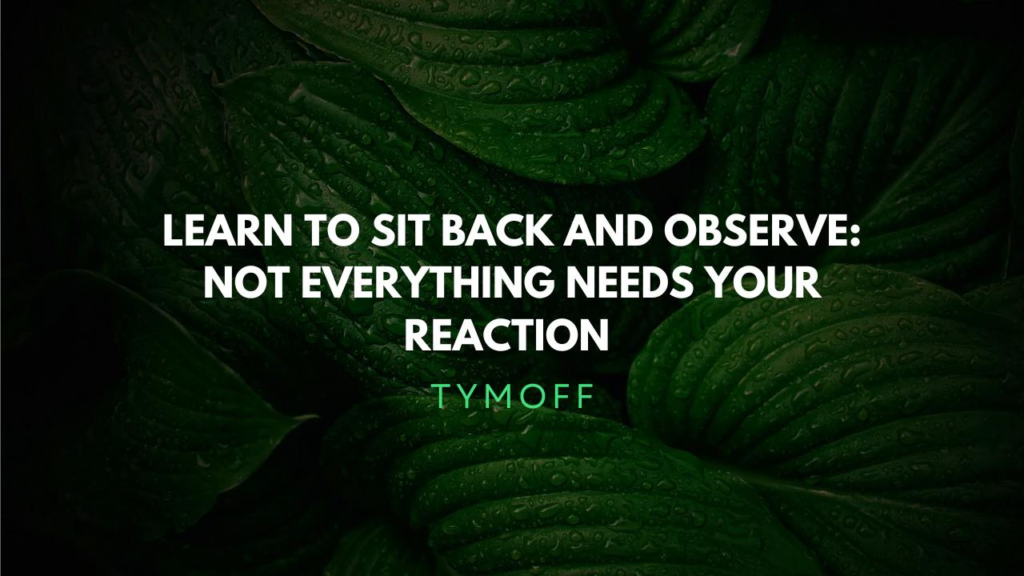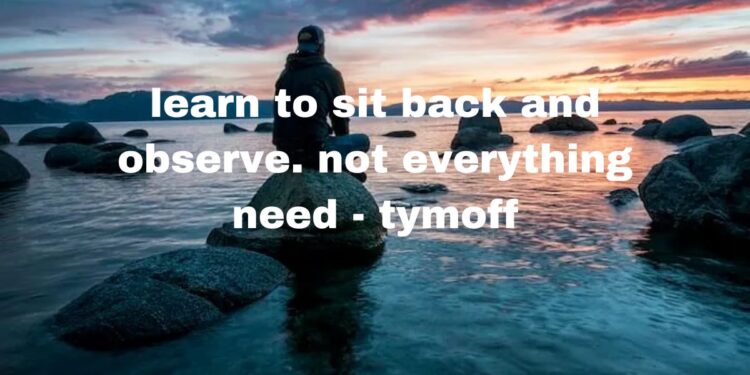Learn to Sit Back and Observe. Not Everything Need – Tymoff encourages patience and mindfulness in a fast-paced world. It reminds us that not every situation requires immediate reactions. By stepping back and observing, we gain clarity, reduce stress, and make better decisions. This simple wisdom promotes a peaceful, intentional way of living, helping us navigate life’s challenges with a calmer, more thoughtful approach.
The Trap of Constant Reaction
Humans are naturally wired to react to their environment. Evolutionarily, our survival depended on quick reflexes to threats. However, in modern times, this instinctive response to stimuli has extended to areas where immediate reactions are often unnecessary. Be it a heated debate on social media, a sudden change at work, or an emotional encounter with a loved one, many of us feel compelled to react instantly. This impulsiveness can lead to hasty decisions, damaged relationships, and emotional burnout.
Sitting back and observing, as Tymoff suggests, is not about ignoring the world around us. Instead, it’s about resisting the urge to let external events dictate our emotional state. It allows us to process what’s happening fully and to choose our response intentionally, rather than reflexively. This approach fosters mindfulness, clarity, and peace of mind.
Learn to Sit Back and Observe

Observation is not a passive act; it’s an active process of understanding the world around us. When we take the time to observe, we begin to notice patterns and details that are often missed in the rush to react. This perspective gives us clarity and helps us make better decisions. For instance, in a workplace setting, observing the dynamics of a team can reveal underlying issues that may not be immediately apparent. Similarly, in personal relationships, pausing to observe can prevent misunderstandings and foster deeper connections.
By observing rather than reacting, we also become better equipped to navigate challenges. Observation allows us to understand the root causes of situations, rather than simply addressing their symptoms. It encourages thoughtful reflection and measured responses, which can significantly enhance our problem-solving abilities.
The Emotional Benefits of Pausing
Emotions play a significant role in how we react to situations. Anger, frustration, and anxiety often drive impulsive reactions that we later regret. By sitting back and observing, we give ourselves the space to process these emotions before they dictate our actions. This practice not only prevents unnecessary conflict but also helps us maintain emotional balance.
When we pause and observe, we activate the part of our brain responsible for rational thinking. This shift allows us to approach situations with logic and understanding, rather than being controlled by emotions. Over time, this practice strengthens our emotional intelligence, enabling us to respond to life’s challenges with grace and composure.
Cultivating Self-Awareness Through Observation
One of the most significant benefits of sitting back and observing is the cultivation of self-awareness. By stepping back from situations, we gain a clearer understanding of our own thoughts, emotions, and behaviors. This awareness is the foundation of personal growth and self-improvement.
For instance, when faced with criticism, an impulsive reaction might be to defend oneself or lash out. However, by observing the situation, we can recognize the underlying emotions driving our reaction—such as insecurity or fear. This recognition allows us to address these emotions constructively, rather than letting them control us. Over time, this practice leads to greater self-confidence and emotional resilience.
Strengthening Relationships Through Mindful Observation
In relationships, the ability to sit back and observe is invaluable. Many conflicts arise not from what is said, but from how it is interpreted. By pausing to observe, we can better understand the intentions and emotions of others, which reduces the likelihood of misunderstandings and conflicts.
For example, during an argument with a loved one, taking a moment to observe their body language, tone, and words can reveal their true feelings. They may not be angry with you but rather frustrated with a situation. This understanding allows you to respond with empathy and support, rather than defensiveness. Over time, this practice strengthens trust and communication, creating deeper and more meaningful connections.
The Role of Mindfulness in Observation
Mindfulness is the practice of being fully present in the moment, without judgment. It is a critical component of Tymoff’s philosophy, as it enables us to observe without reacting impulsively. Through mindfulness, we learn to accept situations as they are, rather than trying to control or change them.
Mindfulness also enhances our ability to focus. In a world filled with distractions, the practice of sitting back and observing allows us to tune out the noise and concentrate on what truly matters. This focus not only improves our productivity but also brings a sense of calm and balance to our lives.
Breaking Free from the Need for Validation
One of the reasons people react so quickly is the desire for validation. Social media has amplified this tendency, with likes, comments, and shares becoming measures of self-worth. However, this constant need for external validation can be draining and unfulfilling.
By sitting back and observing, we shift our focus inward. We begin to seek validation from within, rather than from others. This internal shift fosters a sense of self-assurance and independence, freeing us from the pressures of societal expectations. It allows us to live authentically and confidently, without feeling the need to prove ourselves to anyone.
Practicing Observation in Everyday Life
Adopting the habit of sitting back and observing requires practice and patience. It starts with small, intentional steps. Begin by pausing before responding to situations, whether it’s a conversation, an email, or a decision. Use this pause to gather your thoughts, assess the situation, and choose your response wisely.
Over time, this practice becomes second nature. You’ll find that you react less and respond more. This shift not only improves your interactions with others but also enhances your overall quality of life. Observation becomes a tool for navigating challenges, managing emotions, and achieving personal growth.
The Transformative Power of Observation
The ability to sit back and observe is more than just a skill; it’s a way of life. It transforms how we approach challenges, relationships, and even ourselves. By embracing Tymoff’s wisdom, we can break free from the reactive patterns that hold us back and step into a more intentional and fulfilling way of living.
This practice teaches us that not every situation requires our input or energy. Sometimes, the most powerful thing we can do is simply observe, understand, and let go. In doing so, we reclaim our peace of mind and discover a deeper sense of purpose and clarity.
Conclusion
“Learn to sit back and observe. Not everything needs a reaction – Tymoff” encapsulates a timeless truth about the power of mindfulness and intentional living. In a world that demands constant attention and reaction, this philosophy reminds us to pause, reflect, and choose our actions wisely. By adopting this approach, we can reduce stress, improve relationships, and cultivate a greater sense of self-awareness. Ultimately, it is through observation that we gain the clarity and wisdom needed to navigate life’s complexities with grace and confidence.
Frequently Asked Questions
1. What does “learn to sit back and observe” mean?
- It means taking time to reflect and understand a situation fully before reacting, allowing for thoughtful and intentional responses.
2. Why is it important not to react to everything?
- Reacting to everything can lead to stress, misunderstandings, and impulsive decisions. Observing instead fosters clarity and better decision-making.
3. How can I practice sitting back and observing?
- Start by pausing before responding, practicing mindfulness, and reflecting on your emotions and thoughts in challenging situations.
4. Does observing instead of reacting mean avoiding problems?
- No, it means approaching problems with a calm and measured response rather than reacting impulsively or emotionally.
5. What are the benefits of observing rather than reacting?
- Benefits include reduced stress, improved emotional intelligence, stronger relationships, and better decision-making skills.














